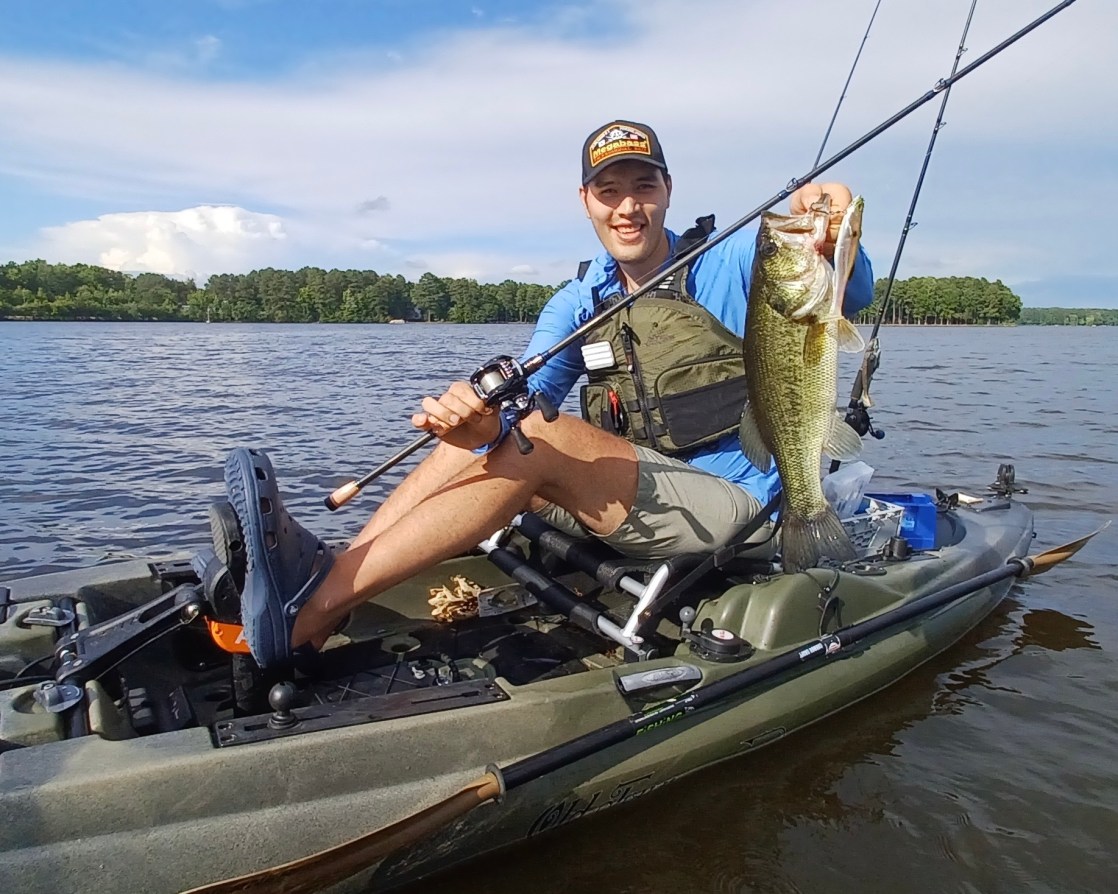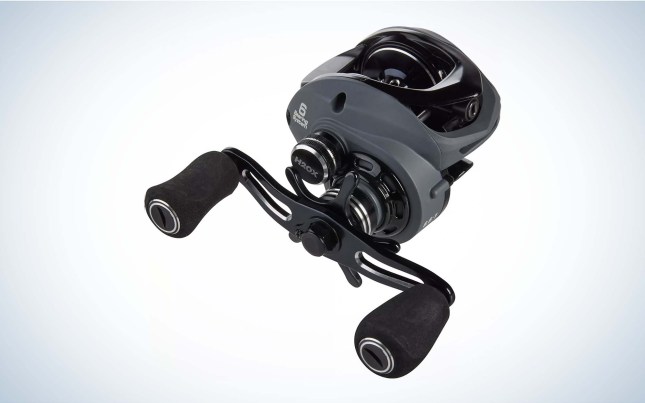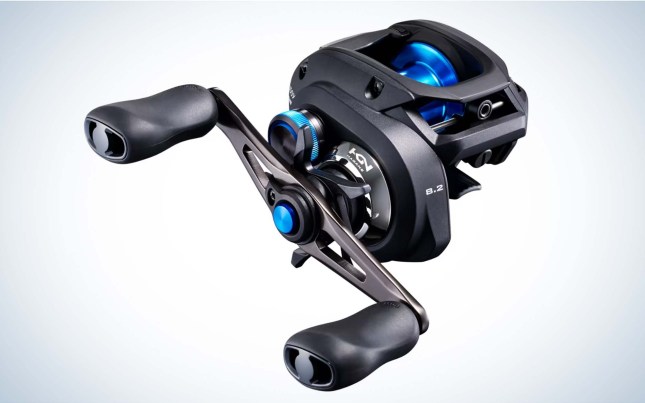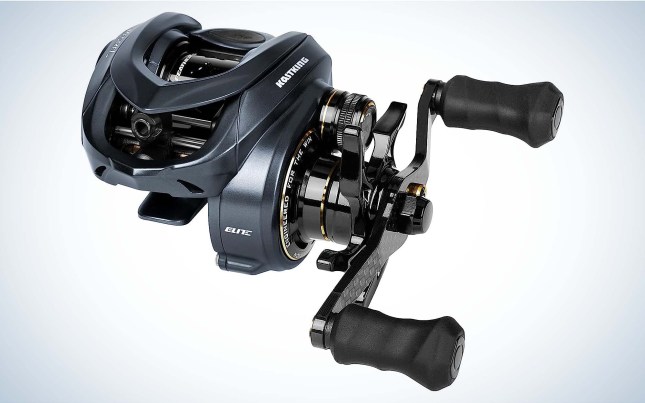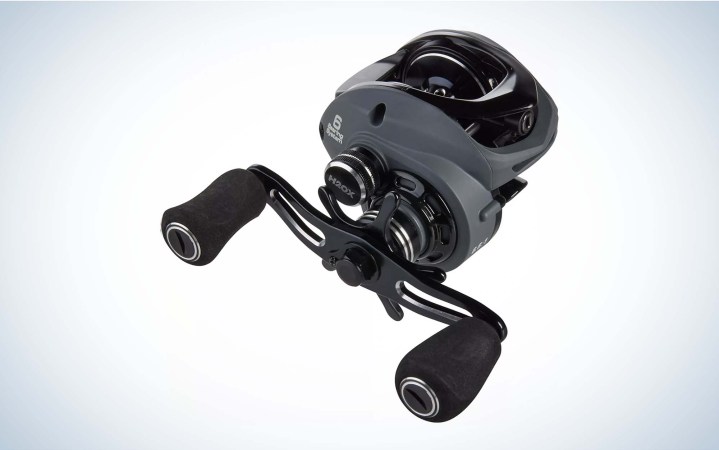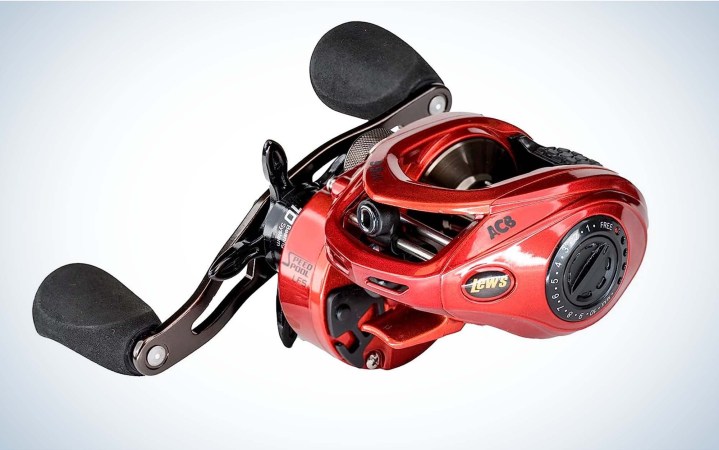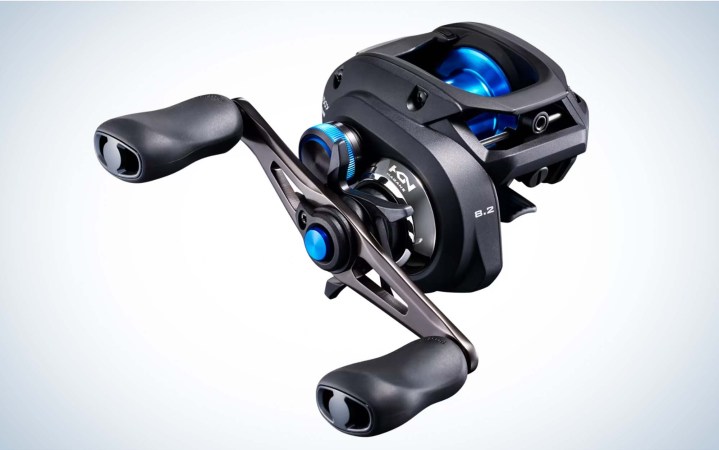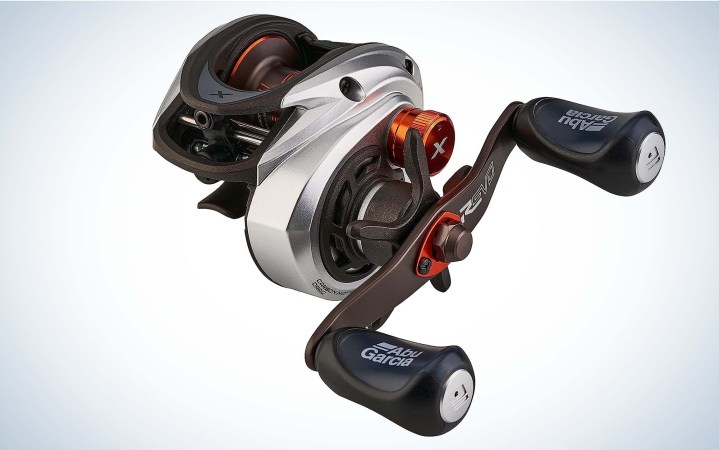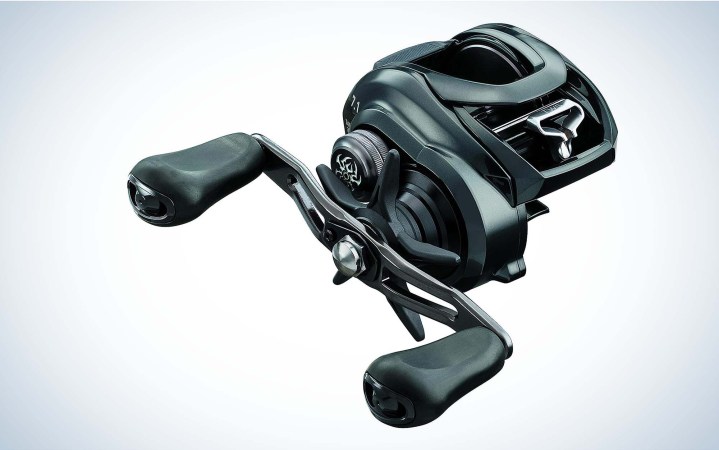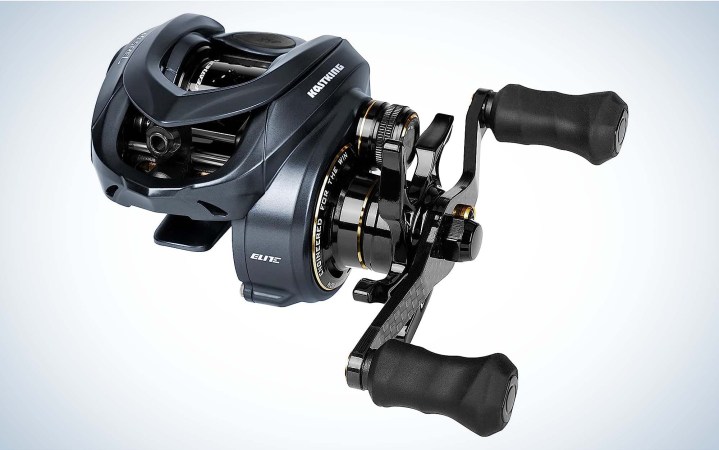We may earn revenue from the products available on this page and participate in affiliate programs. Learn More ›
Today’s baitcasting reels bear a passing resemblance to the first one I bought in 1983 as a tween, but in terms of performance there’s little comparison. Today’s reels are lighter, are more durable, have better drag systems, and come in a greater variety of sizes and speeds. Most importantly, perhaps, they’re much more backlash-resistant. That’s great news if you’re looking for the best baitcasting reel for beginners.
When I got that first baitcaster, “graduating” from spinning tackle, I took on the challenge with trepidation. The rumor from my more advanced peers, as described in just about every fishing magazine, was that if you didn’t have an “educated thumb,” one errant cast or mistimed application of pressure would ruin your day. The spool would explode in what was alternately called a backlash, a bird’s nest, or, most generously, a professional overrun. Overeager beginners spent more time picking out monofilament tangles than they did with a lure in the water. Of course, it wasn’t that bad. After a half hour of practice I was reasonably competent. Still, I lived in fear that a cast with a light lure into the wind would result in disaster.
Today there’s been a light line resurgence, with all serious bass anglers incorporating spinning tackle into their game, but baitcasting remains the heart of the sport in most places. There are so many good choices that it can be hard for a beginner to know what to buy. Here are some favorites, some with bargain price tags, and others that might push a beginner’s budget, but are worth the little bit extra.
- Best Budget: H2OX Premier
- Best High-Speed: Lew’s HyperSpeed LFS Casting Reel
- Best Computer-Controlled: Shimano SLX 150 DC
- Best Workhorse: Abu Garcia Revo X LP Casting Reels
- Best for Big Baits: Daiwa Tatula 300 Casting Reel
- Best Bait Finesse Reel: KastKing Kestrel Elite Bait Finesse Casting Reels
Best Baitcasting Reels for Beginners: Reviews & Recommendations
Best Budget: H2OX Premier
Key Features
- Right-hand retrieve
- 6.6:1 and 7.3:1 gear ratios
- 7.4 ounces
- Six bearings
- Price: $50
Pros
- Ultra-long casting performance
- Tight tolerances and rigid fame
- Comfortable EVA paddles on handle
Cons
- No left-hand version
After fishing this graphite-frame reel, I had to go back and make sure that the price tag hadn’t been a misprint. I consistently grabbed it instead of reels that cost three, four, or five times as much.
Out of the box, it was a jackrabbit, able to cast midrange lures longer distances than anything else I owned without backlashing. In fact I had to tune it down to prevent lofting some of my prized topwaters into the woods. It’s comfortable and feels solid, even after several months of hard use. I used it for bass, catfish, and stripers. The drag never balked or seized, even after fights with those non-green fish. If you’re just investing in baitcasting reels for the first time, it definitely won’t break the bank, and if you want to build a tournament arsenal on a budget, you can get four or five of these for the price of the competition’s mid- to upper-range reels.
Best High-Speed: Lew’s HyperSpeed LFS Casting Reel
Key Features
- Left- and right-hand retrieves
- 6.9 ounces
- 9.5:1 gear ratio
- Nine ball bearings, one roller bearing
- Price: $200
Pros
- Hefty drag system which clicks
- 10 bearing system withstands lightning-fast presentations
- Comfortable thumb bar
Cons
- High speed reels aren’t ideal for all techniques
This red sports car of a reel even looks fast, but it’s built to take a beating in addition to its 9.5:1 gear ratio. It has 20 pounds of drag and is overbuilt with tight tolerances and a one-piece aluminum frame so that whether you’re pitching and flipping or speed reeling your topwater in to cast at a breaking fish, it stays in one piece. For beginners, it has a six-pin, 27-position centrifugal braking system. So, when you get into a hurry and misapply pressure, it won’t result in a backlash catastrophe. It’s also ergonomically comfortable for various hand sizes, preventing cramps after a 300-cast day.
Best Computer-Controlled: Shimano SLX 150 DC
Key Features
- Left- or right-hand retrieves
- 7.6 ounces
- 6.3:1, 7.2:1, or 8.2:1 gear ratios
- Four ball bearings, one roller bearing
- Digitally-controlled braking system
- Price: $200
Pros
- Minimizes backlashes
- External braking options for maximum range of conditions
- Capacity of a 150-sized reel, but still comfortable for all hand sizes
Cons
- Might benefit in some instances from a larger spool size
Shimano’s Curado DC was the first long-term reliable computer-controlled reel at a lower price point than past models. This reel offers many of the Curado’s benefits, at an even lower price point. It has a rigid body, brass gearing, and a handle size that fits hands from extra-small to extra-large. The real selling point is the Digital Control (DC) braking system which produces an audible whir on the cast to let you know that it’s working, and can be adjusted for a range of lure weights, allowing you to cast them into the wind with minimal fear. Yes, some bait finesse reels are made for light lures, but this one has the muscle for heavier lures, and still handles wind with aplomb.
Best Workhorse: Abu Garcia Revo X LP Casting Reels
Key Features
- Left- and right-hand retrieve
- 5.4:1, 6.7:1, and 7.3:1 gear ratios
- Seven ball bearings, one roller bearing
- 7.3 ounces
- Price: $120
Pros
- Modernized line guide reduces line-harming angles
- Comfortable oversized PVC handle knobs
- Easy to palm
Cons
- No super high-speed option
Abu Garcia keeps on iterating their proven Revo lineup, each time upgrading the features and technology available. While the highest-price models may have a few more features or styling flourishes, the Revo X LP offers a ton of value in a package with most of the same benefits. Those include an asymmetric design that makes it easy to hold, a pushed-forward line guide to protect your line from sharp edges, and a Mag Trax brake system to minimize backlashes. Any beginner can buy this reel—or several of them—and be confident that it has the same technology found on many pros’ decks.
Best for Big Baits: Daiwa Tatula 300 Casting Reel
Key Features
- Left- and right-hand retrieves
- 5.3:1 (right), 6.3:1, 7.1:1, and 8.1:1 gear ratios
- 11.5 ounces
- Seven ball bearings, one roller bearing
- Price: $234
Pros
- Generous line capacity
- Bigger gears for bigger fish and lures
- Daiwa’s T-Wing system for long casts
Cons
- Not suited for small to mid-sized lures
As the fish you’re chasing and the lures needed to tempt them grow in size, it’s critical to beef up every component of a reel. That usually comes at a cost, and while this reel is not inexpensive, it still costs less than replacing one year after year when the fish of a lifetime strips gears or the frame falls apart from too many rough boat rides. It lives at the intersection of Daiwa’s best bass tournament tools—with features like the T-Wing system for long casts—and their saltwater tools, made to handle rampaging tuna and inshore species. It’s heavier than most standard baitcasters by several ounces, but on the properly balanced rod it’s not cumbersome, and because it’s offered in multiple gear ratios from “slow” to “fast,” anglers can find the one that balances their needs, too.
Best Bait Finesse Reel: KastKing Kestrel Elite Bait Finesse Casting Reels
Key Features
- Left- and right-hand retrieves
- 8.4:1 gear ratio
- 4.4 ounces
- 11 ball bearings, one roller bearing
- Price: $220
Pros
- Ridiculously lightweight
- Handles light line well, with no gaps for it to slip behind
- Precision magnetic braking system
Cons
- Only one gear ratio option
Bait finesse is a relatively new phenomenon that originated in Japan and involves throwing lighter-than-usual lures on baitcasting gear. It can be particularly daunting for beginners who’ve bought into the ideology that such lures can and should be fished only on spinning tackle. This reel should minimize your fear of backlashes and maximize your willingness to try the technique. It’s not clear how they stuffed so much technology, including 12 bearings, into this diminutive package, but KastKing has built a toy-sized product that behaves like anything but child’s play. Whether you’re dropshotting, throwing a micro-jig, or flinging a tiny crankbait, this reel is a super-smooth joy to fish and feels rock solid. It has a carbon disc drag system to handle the big fish that will inevitably ensue.
Things to Consider Before Buying a Beginner Baitcasting Reel
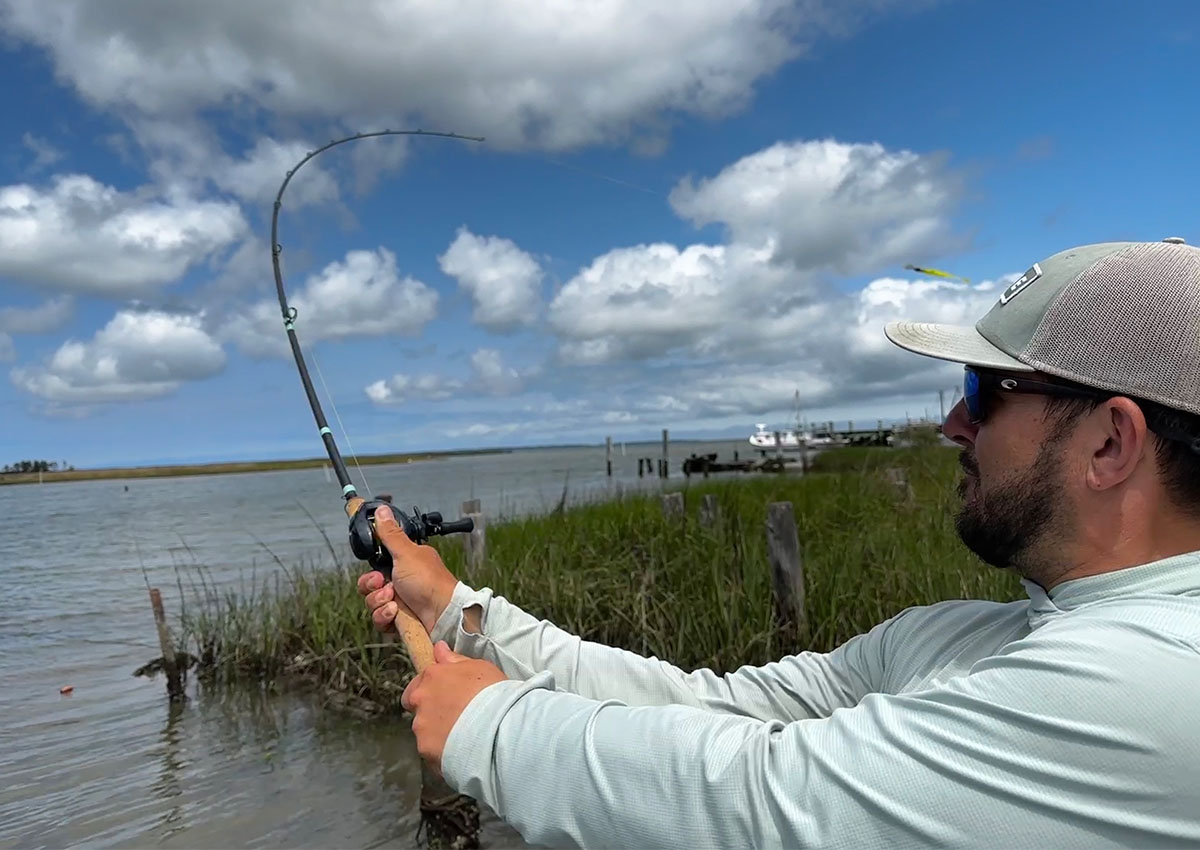
Price
There are quality baitcasting reels available at price points from less than 50 bucks to nearly a thousand, and while you generally get what you pay for, that’s not always the case. An expensive niche reel may not perform as well as a lesser-priced and lesser-outfitted reel when used for the wrong technique. Furthermore, eventually most anglers want more than one, so if you’re building a team of baitcasters don’t shoot the entire budget on one reel, leaving crumbs for the others.
Line Capacity
While big baits might require 20- or 25-pound mono or fluoro, or 80-pound braid, a reel made for bait finesse might only hold a few yards of that strength. On the flip side, a reel made for big baits and heavy line won’t be able to handle 8- or even 10-pound line. Figure out the range of diameters you’ll be using and then find the reel that will not only cast them well, but will hold enough for long casts and line-burning runs.
Lure Size
Yes, small reels can handle heavy lures in a pinch, and vice versa, but by adhering closely to the recommended ranges, not only will you minimize backlashes, but you’ll limit strain on the reel’s components.
Why Trust Outdoor Life?
Since 1898, OL has been a leading authority in testing and reviewing hunting gear, fishing tackle, guns and shooting equipment, and much more. We have more than a century-long history of evaluating products, and we’re now bringing that expertise to online reviews. Our editors are experienced outdoorsmen and women, and most importantly, we’re trained journalists. We prioritize field testing and objective data when reviewing products. We conduct interviews with gear manufacturers and engineers as well as outdoor experts so that our readers have an understanding of how and why a product works—or doesn’t.
Advertising does not influence our gear reviews and it never will. While we always focus our coverage on standout products—because we want our readers to be aware of the latest and greatest gear—we also cover the flaws and quirks of any given product.
Final Thoughts on the Best Baitcasting Reels for Beginners
Baitcasting beginners no longer need to fear entering the genre, or losing whole spools of expensive line (braid and fluorocarbon weren’t generally available when I bought my first baitcaster) to unruly tangles. Indeed, the biggest question now is which of the many models at a huge array of price points to buy. If you’re beginning with baitcasters altogether, get a standard-sized reel at a midpoint (6:1 or 7:1 gear ratio) but if you’re trying out a new technique with specific needs, opt for a specialized reel.
